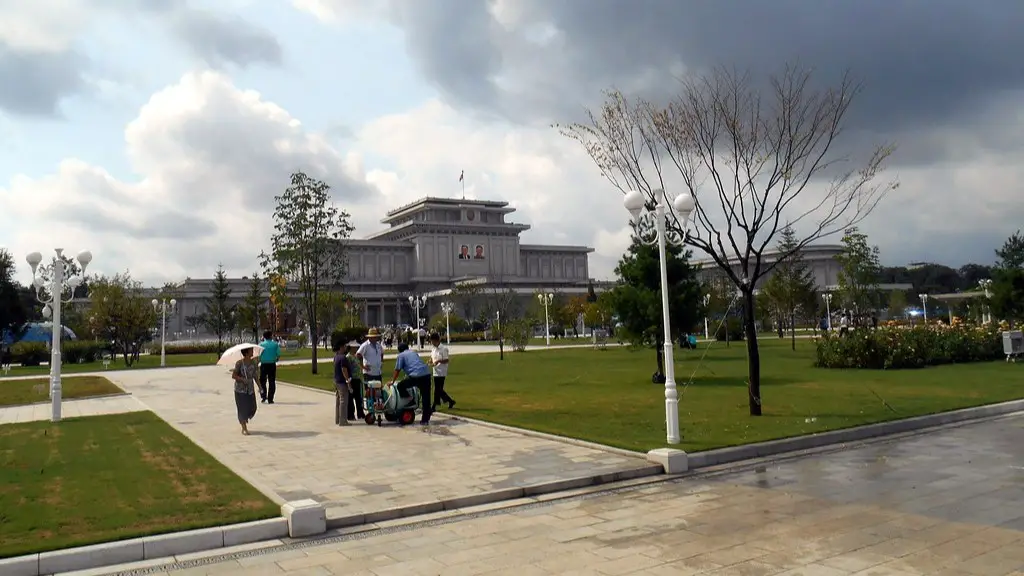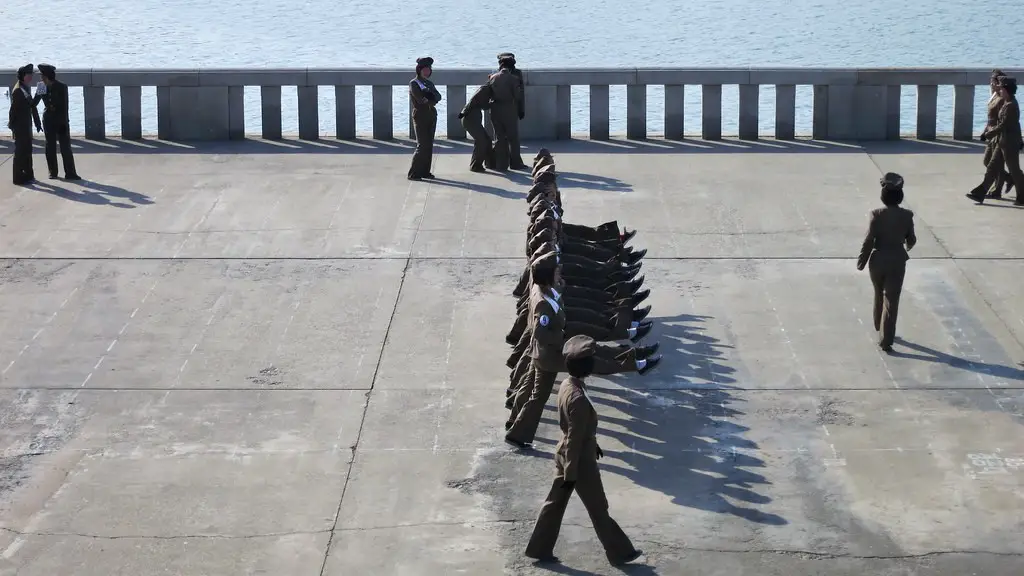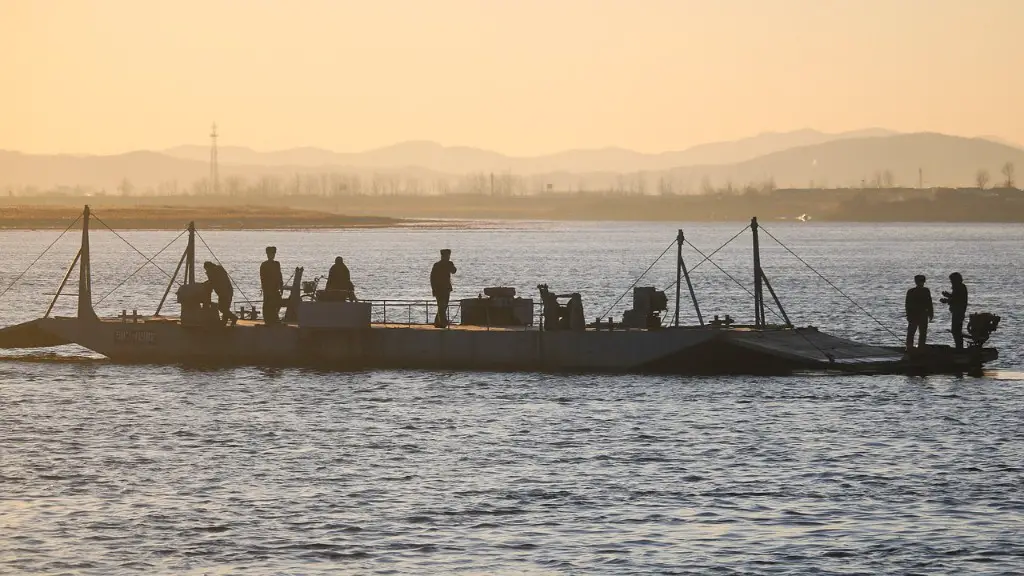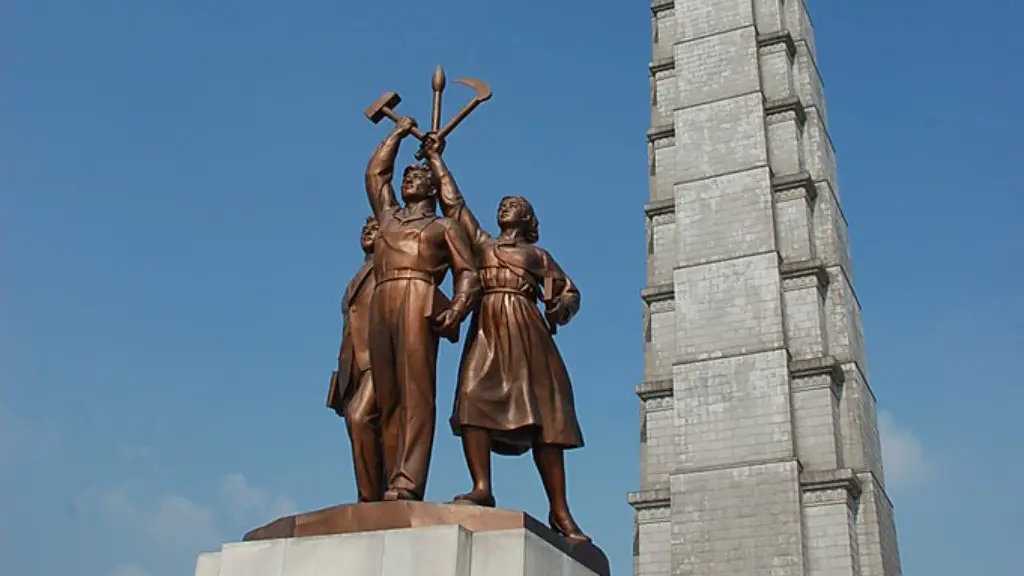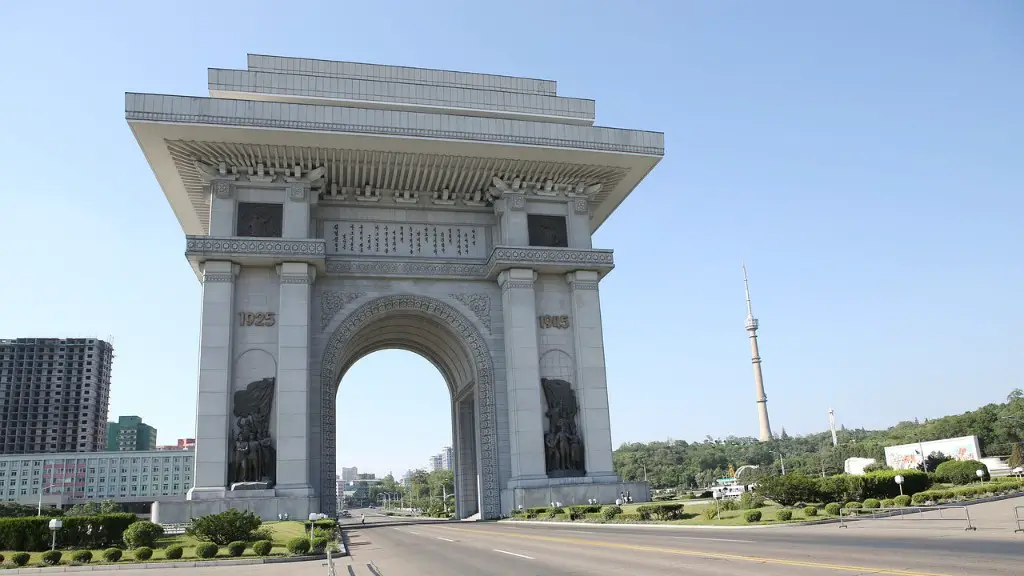North Korea is a country whose reputation has been tarnished by its oppressive government, extreme nuclear testing, and human rights violations. The international tensions between North Korea and its neighboring countries have been well documented, leading to arguably one of the most extreme diplomatic conflicts of our time. As the situation continues to remain volatile, it is essential to consider potential solutions to the problem.
Experts have offered multiple solutions to the problem, ranging from economic sanctions and diplomatic negotiations to military action. In particular, economic sanctions have been discussed at length, as they offer a viable way to impede the regime’s development of nuclear weapons. For example, sanctions prohibiting the import of goods and services from the country have been placed on North Korea by the United Nations Security Council in order to reduce the funding available to the government. Organizations such as Human Rights Watch have argued that these economic sanctions are ultimately detrimental to the country’s population as well as a violation of their human rights, but the debate is ongoing.
In addition to economic sanctions, diplomatic negotiations have been discussed as a potential solution. Negotiations have previously been offered in the form of the Six-Party Talks (2003-2008), among other initiatives, in which the United States, China, Russia, South Korea, North Korea, and Japan all agreed to denuclearize the Korean Peninsula. Ultimately, however, the talks failed and North Korea continued to pursue its nuclear program.
Others have argued for a more aggressive approach in dealing with North Korea, proposing military action as the only way to truly deter the country from pursuing nuclear weapons. Proponents of this idea believe that only through military means can the security of the United States and stability of the region be ensured. However, military action is incredibly risky due to the potential for escalating tensions and the ease with which North Korean forces could cause death and destruction in the region.
My personal opinion is that none of these approaches are ideal as a long-term solution to the North Korean crisis. Instead, I believe a multifaceted approach is necessary. Combining diplomatic negotiations, economic sanctions, and, if necessary, military action, could be the most effective measure to contain the Korean situation. This could arguably lead to some form of sustainable peace in the region.
Role of the International Community
The international community has an important role to play in the resolution of the North Korean crisis. Through discourse between governments and institutions, important agreements can be made and initiatives can be put in place to reduce tensions between North Korea and its neighbors, promote dialogue and peace, and ensure the safety of civilians in the region. Various countries have already taken steps to impose economic sanctions, and discussions are ongoing regarding the best way to decrease North Korea’s nuclear capabilities. Many countries have also vowed to ensure the peace process through peaceful diplomacy and robust economic sanctions, rather than military intervention.
It is essential that the international community stay involved and continue to offer solutions to the North Korean crisis. In particular, the UN Security Council must remain active in discussing the situation and imposing relevant economic sanctions. Other international bodies, such as the European Union, the Red Cross, and the Non-Aligned Movement have also taken an active role in the attempt to reach a diplomatic solution.
In addition, it is important to recognize the need for countries to build meaningful collaborations and relationships in order to ensure a successful peace process. Countries must collaborate to not only find a resolution to the conflict, but also to ensure that the resolution is sustainable in the long-term.
Position of the United States
The United States has been a major player in the North Korean crisis, as the two countries have had a tumultuous history. Under the Trump Administration, the US has taken a much more aggressive stance and has imposed some of the most severe economic sanctions on North Korea. President Trump has been unyielding in his demands that North Korea cease their nuclear and missile developments and has even threatened military action as a possible solution.
Critics argue that President Trump’s policies have been too aggressive, and have had the unintended consequence of increasing tensions between the two countries. They argue that a more diplomatic and negotiated approach would be more effective in achieving a sustainable resolution to the conflict. In order to do this, the United States must demonstrate their willingness to negotiate and discuss the issue in good faith, with a realistic and achievable goal in mind.
My view is that the United States must be willing to cooperate and work with other countries in order to find a viable solution to the North Korean crisis. This includes engaging in meaningful dialogue with North Korea, and being open to diplomatic negotiations. It is essential that the US shows its commitment to finding a peaceful resolution and preventing an escalation of the conflict.
Humanitarian Crisis in North Korea
It is important to recognize that the North Korean crisis extends beyond the threats of nuclear weapons, and extends to the grave humanitarian crisis in the country. Humanitarian aid organizations have reported a severe lack of food and medical supplies in North Korea, leading to the country being dubbed a “hunger state” by the World Food Programme. It is estimated that more than 10 million people are in need of food and medicine, and the situation is worsened by the lack of access to supplies caused by the economic sanctions imposed by the United Nations.
In order to address the humanitarian crisis in North Korea, I believe the international community should work to alleviate the suffering of the people of North Korea. Humanitarian aid such as food and medical supplies should be provided to the country, and access should be unhindered by economic sanctions and further diplomatic tension. Along with this, North Korea should be encouraged to cooperate with humanitarian organizations and allow greater access to the country and its resources.
It is essential to recognize the human rights situation in North Korea as it is a major factor contributing to the tensions between the country and the international community. When formulating strategies to resolve the North Korean crisis, it is important to consider the wellbeing of the people in the region and to strive for a resolution that will lead to the protection of the people of North Korea.
Limitations on International Action
Many countries around the world have recognized the severity of the North Korean crisis and have taken steps to address it. Yet, there are a number of limitations on international action when it comes to this issue. For one, each country has their own interests to consider and thus, diplomatic negotiations are often based on a country’s own agenda rather than the greater good. In addition, international organizations lack enforcement powers, meaning that agreements between countries are often not followed through. Lastly, the North Korean government is often reluctant to cooperate with international initiatives, and the country’s oppressive regime makes it difficult for citizens to express their views.
Given these limitations, the best course of action for the international community is to focus on finding a sustainable resolution to the North Korean crisis. The conflict will only be resolved if all countries are willing to cooperate and work together to find a peaceful solution that will benefit the entire region. Countries must also take responsibility for their own actions and strive to reach a resolution that is acceptable to all parties involved.
Potential Impact of Solutions
In order to truly find a sustainable resolution to the North Korean crisis, it is essential to consider the potential impact of various solutions. For instance, it is important to recognize that a military strike would have grave consequences for the region and could result in a major conflict that would put millions of lives at risk. Similarly, economic sanctions have had a detrimental effect on the North Korean population, leading to a shortage of food and medical supplies and worsening the country’s humanitarian crisis.
It is therefore important to consider the potential impact of any solution proposed. Solutions must be deemed reasonable and acceptable to all parties involved, and must be carefully planned out and implemented in order to be effective. If a viable solution can be found in which various parties are willing to cooperate, it is likely that a peaceful resolution to the North Korean crisis can be achieved.
Role of the Media
The media has a crucial role to play in the resolution of the North Korean crisis. Through unbiased and informative reporting, the media can act as a tool to spread awareness regarding the situation in the region and to keep the international community informed on the North Korean issue. Moreover, the media can act as a platform for free speech, allowing people in the region to speak out about the conflict and have their voices heard.
The media can also help to humanize the North Korean population, highlighting the issues that they face and the suffering they endure due to the conflict and their oppressive government. In doing so, the media can help to increase empathy and understanding between North Korea and its neighbors, while also raising awareness regarding the importance of finding a sustainable resolution to the conflict.
Overall, I believe that media has an incredibly powerful role to play in this situation, and should be used to promote dialogue and understanding, rather than to stoke hostility and fear. The media can be instrumental in helping to spread awareness of the conflict, encouraging dialogue and understanding between the various regional players, and finding a lasting resolution to the North Korean crisis.

